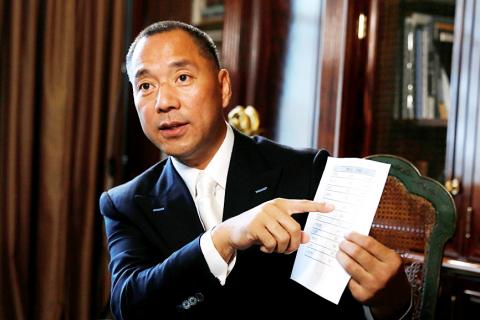Chinese tycoon Guo Wengui (郭文貴) yesterday said that China had monitored the private lives of former president Ma Ying-jeou (馬英九) and his two daughters, putting pressure on Ma to submit to Beijing’s every wish, including imprisoning former president Chen Shui-bian (陳水扁).
Guo, a controversial real-estate developer, on Monday uploaded a video to YouTube and Facebook in which he discussed a meeting he said he had in 2008 with an unnamed Chinese who was then a high-ranking officer in the Chinese People’s Liberation Army General Political Department.
Ma won his first term as president that year.

Photo: Reuters
Guo said he asked the official whether China would be able to “rein Ma in,” to which the official replied: “No doubt we can control him. He will listen to us 100 percent.”
When asked to expound on China’s “control” over Ma, Guo quoted the official as saying: “Ma will redefine the [so-called] 1992 consensus during his term and develop closer economic ties between Taiwan and China. Our economic carrots will definitely take effect.”
Ma would definitely imprison Chen on Beijing’s instruction, which was China’s move to “intimidate” the Democratic Progressive Party, Guo quoted the official as saying.
“We have monitored Ma’s private life and his two daughters for many years,” the official added. “He would not say a word. He will do whatever we want him to do.”
“His every move is under our eyes and so are his two daughters,” the official said.
When asked what Beijing would do if Ma refused to cooperate, Guo said the official told him that Ma would not refuse, as Beijing had a plan in store that would “destroy” Ma.
Guo said that in retrospect, he realized that everything the official said had played out during Ma’s time in office, citing his “audacious” policies to increase economic ties with China and his “radical” imprisonment of Chen.
“I welcome Ma to press charges against me. I would be happy to testify in a Taiwanese court of law or go to Taiwan to present the evidence,” he said.
Guo also spoke about three strategies formulated by China to rein in Taiwan and Hong Kong, which he said would inflict “more damage than a nuclear weapon.”
The first is China’s manipulation of information in Taiwanese and Hong Kong stock exchanges and politics, including distorting financial information and imprisoning Chen and former Hong Kong chief executive Donald Tsang (曾蔭權) — all of which transpired according to Beijing’s design, he said.
The second strategy involves filming businesspeople and officials gambling or accepting sexual favors and using the footage to blackmail them.
Another strategy is deceiving businesspeople into believing they are exempted from paying taxes when conducting business in China and then threatening to prosecute them over tax evasion unless they promise to carry out China’s plans to “corrupt” officials at home, Guo said.
Ma’s office spokeswoman Hsu Chiao-hsin (徐巧芯) said that people should not get worked up over unfounded claims.
“All the allegations are imagined,” she said.

INVESTIGATION: The case is the latest instance of a DPP figure being implicated in an espionage network accused of allegedly leaking information to Chinese intelligence Democratic Progressive Party (DPP) member Ho Jen-chieh (何仁傑) was detained and held incommunicado yesterday on suspicion of spying for China during his tenure as assistant to then-minister of foreign affairs Joseph Wu (吳釗燮). The Taipei District Prosecutors’ Office said Ho was implicated during its investigation into alleged spying activities by former Presidential Office consultant Wu Shang-yu (吳尚雨). Prosecutors said there is reason to believe Ho breached the National Security Act (國家安全法) by leaking classified Ministry of Foreign Affairs information to Chinese intelligence. Following interrogation, prosecutors petitioned the Taipei District Court to detain Ho, citing concerns over potential collusion or tampering of evidence. The

NEGOTIATIONS: Taiwan has good relations with Washington and the outlook for the negotiations looks promising, Minister of Economic Affairs J.W. Kuo said Taiwan’s GDP growth this year is expected to decrease by 0.43 to 1.61 percentage points due to the effects of US tariffs, National Development Council (NDC) Minister Paul Liu (劉鏡清) said at a meeting of the legislature’s Economics Committee in Taipei yesterday, citing a preliminary estimate by a private research institution. Taiwan’s economy would be significantly affected by the 32 percent “reciprocal” tariffs slapped by the US, which took effect yesterday, Liu said, adding that GDP growth could fall below 3 percent and potentially even dip below 2 percent to 1.53 percent this year. The council has commissioned another institution

TRADE: The premier pledged safeguards on ‘Made in Taiwan’ labeling, anti-dumping measures and stricter export controls to strengthen its position in trade talks Products labeled “made in Taiwan” must be genuinely made in Taiwan, Premier Cho Jung-tai (卓榮泰) said yesterday, vowing to enforce strict safeguards against “origin laundering” and initiate anti-dumping investigations to prevent China dumping its products in Taiwan. Cho made the remarks in a discussion session with representatives from industries in Kaohsiung. In response to the US government’s recent announcement of “reciprocal” tariffs on its trading partners, President William Lai (賴清德) and Cho last week began a series of consultations with industry leaders nationwide to gather feedback and address concerns. Taiwanese and US officials held a videoconference on Friday evening to discuss the

NEGOTIATIONS: The US response to the countermeasures and plans Taiwan presented has been positive, including boosting procurement and investment, the president said Taiwan is included in the first group for trade negotiations with the US, President William Lai (賴清德) said yesterday, as he seeks to shield Taiwanese exporters from a 32 percent tariff. In Washington, US Trade Representative Jamieson Greer said in an interview on Fox News on Thursday that he would speak to his Taiwanese and Israeli counterparts yesterday about tariffs after holding a long discussion with the Vietnamese earlier. US President Donald Trump on Wednesday postponed punishing levies on multiple trade partners, including Taiwan, for three months after trillions of US dollars were wiped off global markets. He has maintained a 10 percent